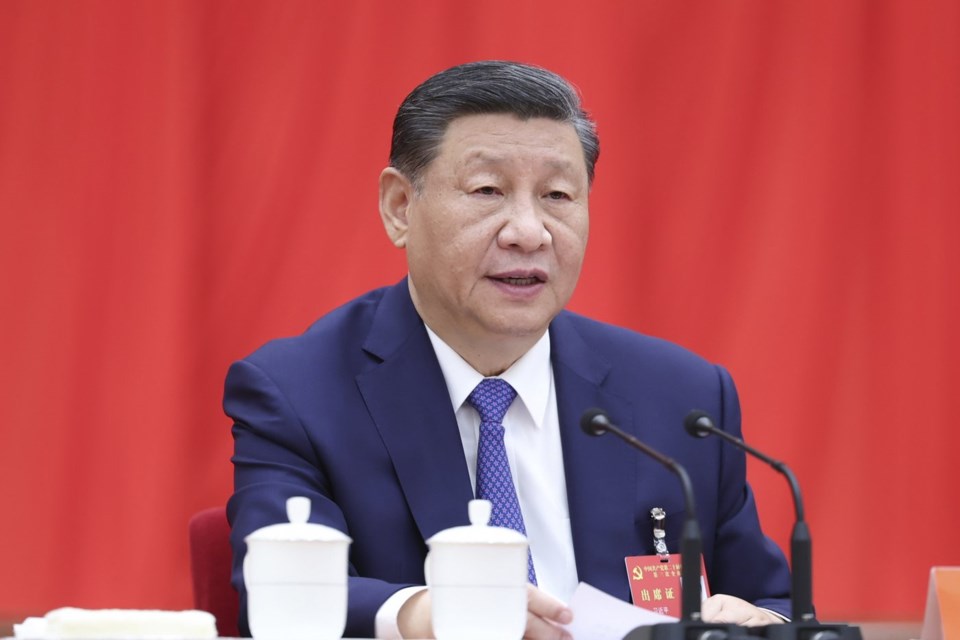BEIJING (AP) — China’s ruling Communist Party wrapped up a on Thursday by endorsing policies aimed at advancing the country’s technological power and fortifying its national security.
A statement released when the four-day meeting ended provided only a broad-brush summary. More details are likely to emerge in the coming days.
“The current and future period is a critical time for comprehensively promoting the construction of a strong country and the great cause of national rejuvenation using Chinese-style modernization,” the statement said.
It said the tasks outlined in the meeting would be completed by 2029, the 80th anniversary of the founding of the People’s Republic of China.
The statement said it is necessary to coordinate development and security, a nod to concern that expanding national security enforcement is weighing on the economy.
But it stressed that "national security is an important foundation for the steady and long-term development of Chinese-style modernization,” noting that the “leadership of the party is the fundamental guarantee” for achieving that goal.
The meeting also endorsed leader Xi Jinping’s repeated calls for “high-quality development," signaling Beijing will continue to prioritize investing in technologies and encouraging companies to upgrade their equipment and knowhow at a time when China faces on access to Western advanced technology, such as leading-edge computer chips and artificial intelligence.
“High quality development is the primary task of building a modern socialist country in an all-round way,” the statement said.
Foreign investors and markets were watching to see what the party might do to counter the sector and weak consumer confidence that has hindered China’s recovery from the COVID-19 pandemic.
Economic on an annual basis in the April to June quarter, as investments in real estate and property sales continued to decline despite a raft of measures aimed at encouraging families to buy housing.
Addressing concerns that have weakened consumer confidence, Thursday's statement acknowledged the need to improve “basic and bottom-up livelihood, solve the most direct and realistic interests of the people and continuously meet the people's yearning for a better life.”
It promised improvements to income distribution, job markets, social security and the medical system, but gave no specifics.
Likewise, the statement mentioned the need to address risks in the property market and other threats to the economy, without providing details.
Another priority is relieving the financial squeeze on local governments that have built up huge amounts of debt after a crackdown on heavy borrowing by property developers pushed the real estate industry into crisis, cutting off a vital source of tax revenues from sales of land-use rights.
The announcement Thursday only alluded in general terms to the need to reform the tax system and better integrate cities and the countryside.
Chinese leaders have repeatedly said the country will remain open to foreign investment and improve the business environment, despite ever-extending Communist Party controls over companies, social media, financial regulators and other aspects of life.
Thursday's statement repeatedly reiterated the need for openness and open markets, but also said the party must prevent any “ideological risks.”
The meetings are unlikely to make a major change in policies, Julian Evans-Pritchard of Capital Economics said in a commentary. “And there still appears to be a tension between policies aimed at boosting economic security and expanding the supply-side of the economy, and those aimed at giving market forces a greater role and rebalancing growth toward consumption,” he said.
This week’s meetings are of the 205-member party Central Committee, which began a five-year term in 2022. Delayed from last year, third plenums usually set major economic and policy decisions. Past landmark plenums launched China into its ascent as a world manufacturing and financial power in an era of “reform and opening up.”
Details of any policy decisions will come gradually, and probably after the party's powerful Politburo meets later this month.
The meeting also dealt with disciplinary actions against some former senior officials. It dismissed former Foreign Minister Qin Gang from the Central Committee and approved investigation reports on three former military officials.
Qin was about a year ago after only a few months in office. The government has yet to explain why.
The reports from the Central Military Commission investigated what the statement called “serious violations of discipline and laws” by former Defense Minister Li Shangfu and two officials dismissed from the military's rocket force, former commander Li Yuchao and former chief of staff Sun Jinming.
The Defense Ministry that Li, the ex-defense minister, had abused his authority by taking bribes in exchange for granting favors. He was dismissed last year after less than a year in his post.
The unexpected dismissals of the new foreign and defense ministers raised questions about party leadership but don’t appear to have affected government policy.
The statement emphasized the importance of modernizing the military at a time of growing tensions with the United States and Asian neighbors. It called for improving the leadership and management of the military and operations across its different branches.
___
Kurtenbach reported from Bangkok.
Ken Moritsugu And Elaine Kurtenbach, The Associated Press




